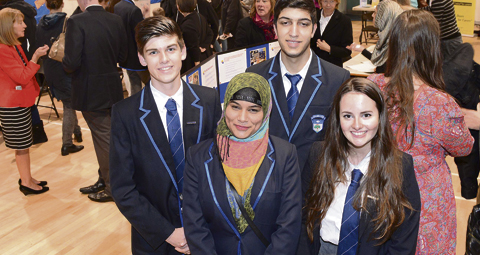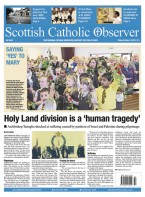BY Martin Dunlop | September 27 | ![]() 0 COMMENTS
0 COMMENTS ![]() print
print

Holyrood is breaking down barriers
As one of more than 2000 pupils and part of Europe’s largest school it would be understandable for any young child to feel a sense of trepidation joining Glasgow’s Holyrood Secondary School, let alone a young pupil with additional support needs.
To counter any potential barriers to such pupils enjoying a fair and fruitful education, Holyrood works with a number of different partners and local community groups to support children with additional support needs, a programme that was showcased at an information evening for parents at the school last Thursday evening.
Laurie Byrne, Holyrood headteacher, said that many parents often ‘have concerns about approaching the school for help.’
“An evening like this puts the child at the centre and allows the school to take the role of supporter and facilitator,” he said. “We were delighted at the response from support agencies and were happy to see so many parents and families present.”
During the information evening, parents were invited to spend time speaking to representatives from Holyrood’s partner organisations, including Dyslexia Support and Glasgow South East Carers Centre.
Margaret Leyden, depute headteacher at Holyrood, explained that the idea for the additional support needs evening was to bring all the school’s local community groups together for one evening and ‘give parents the opportunity to see just what is on offer for all their children, and not just those in Holyrood Secondary.’
“We have an excellent programme of support within the school which is constantly changing as new supports are evolving,” she said. “The aim of the evening was to inform parents and to provide a warm welcome to all. It also raises awareness of the other services from agencies such as the NHS where promoting positive parenting is on offer and the police, who are currently working on a community-building programme in the area. It puts parents in touch with interpreting services, careers and our educational psychologists.”
Like many schools throughout the country, Holyrood has a number of pupils who, in addition to their schoolwork, are performing the role of a home carer.
Graeme Campbell, who was representing Glasgow South East Carers Centre at last Thursday’s information evening, explained that a young carer could be providing care for a family member who is ill, has a disability, mental illness or has an addiction to alcohol or is a substance abuser.
As Mr Campbell highlighted, a lot of school pupils fail to recognise themselves under the term ‘carer’ and see themselves solely as a son, daughter, brother sister or friend.
“We try to raise awareness of young carers in school and try and give young people one-to-one support,” he said. “We try to help them realise that there is help and assistance out there for them. One of the ways we do this is by holding assemblies in schools.
“We have 180 young carers registered in the south east of Glasgow, but there will be more out there.”
In an ethnically diverse school such as Holyrood there are a number of pupils, and parents, who speak English as an additional language.
Richard McNeish of Cordia Linguistics explained that his organisation provides translation services to communities throughout Glasgow.
“It is very important for parents to know that services such as ours are available to them,” he said.
Among those in attendance at the parents information evening was Maeve Scullion, whose son, a Holyrood pupil, has dyslexia and sydenham’s chorea.
“The school has been wonderful and treats him with a holistic view to education,” she said. “At evenings such as this, you realise that you are not alone and it is good to know what services are on offer from the school. I think the parents evening has widened everybody’s horizons.”
Ms Leyden expressed her delight at the ‘excellent turnout’ and spoke of the early, positive feedback the school has already received.
“We hope to make this a permanent feature on our school calendar,” she said.











